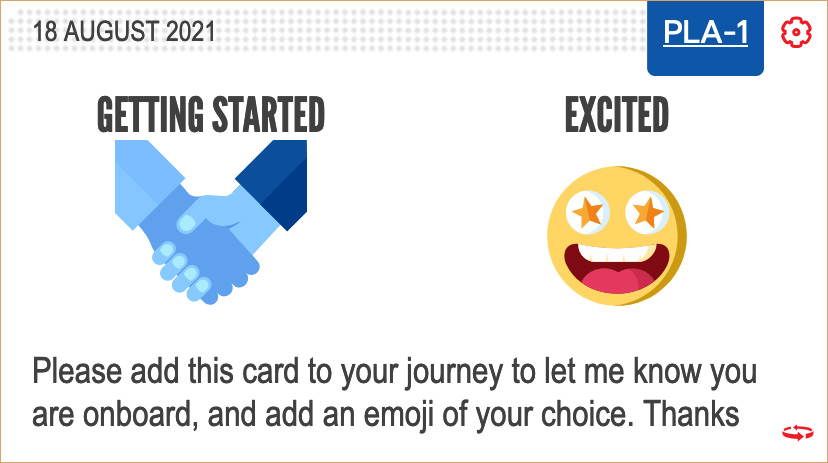Supporting students with Our Journey
Go to the guide for students- Introduction to Our Journey
- Planning your approach
- Guiding students as they create their journeys
- A mindful approach
- A retrospective approach
- A skills-focussed approach
- Using group cards to direct students’ attention
- Supporting students to reflect
- A self-compassion lens
- A growth mindset lens
- Values lens
- Finally

Introduction to Our Journey
Welcome to Our Journey! We hope you and your students enjoy using the platform, and that this guidance can help you get the best from using this with students.
It’s helpful to consider from the outset your goals and objectives. You might want to support students to reflect on their challenges and achievements as they progress through their studies, or you might want to encourage mindful thinking or growth mindset as they log their experiences. Equally, you might want to use Our Journey to better understand your students’ experiences, in order to mentor them or adapt your teaching and support to their needs.
In the sections that follow, we’ll talk through some approaches you can use with your students, to support them to tell their stories and reflect on their journeys. These are suggestions you can try, but do feel free to create your own approach; no two users use Our Journey in the same way. So be open with yourself, approach it with curiosity and give it a try.
Back to top
Planning your approach
As you start to use Our Journey, there are some considerations to be made about how you and your students will interact around the journeys they create. Our Journey is designed so that each student maintains ownership of their journey; by default, only they can see it. However, they can opt to share it with the hosts of a group. They can also save a copy of their journey and download it to share it more widely (this is available in PDF or as a text only document, optimised for screen-readers.)
It is important to think about whether sharing is appropriate or necessary to achieve your goals. Part of the reason Our Journey gives control of sharing to the student is to encourage them to see the platform as a space in which they can be honest about their experiences. As we worked with students to design the platform, one issue that came up was that if students felt they were being watched, judged, or didn’t understand or control who could see their journey, they may be less likely to be honest and authentic. However, it could be very valuable for them to share their journey with you or with others, as long as they feel comfortable doing so.
Sharing can be important for mentoring or student support relationships, or for understanding how a class of students is doing. If students are not expected to share their full journeys, group hosts can still get some awareness of how students are doing using their group dashboard. This shows a bigger picture of which types of events each student has used in their journey and an overview heatmap which shows the emotions students are using when they talk about particular types of events.
Please contact ourjourney@open.ac.uk for more guidance on setting up groups and asking students to share their journeys.
Back to top
Guiding students as they create their journeys
The student-facing guidance for Our Journey suggests some approaches that you may want to use with your students, or allow them to choose. Here are some examples of approaches you might want to suggest.
A mindful approach
If you’d like your students to develop a mindful approach to learning, you can use Our Journey to encourage them to log and reflect on the things that happen to them and how they feel about them. You can advise students to log small, everyday things as well as more significant ones; for example:
- Things that make them feel happy, proud, satisfied or positive
- Things that make them feel angry, scared, insecure or negative
- Their favourite or least favourite thing of the week
- Things they’ve read, watched or listened to that have an impact on them (they can include a link in their card)
- Feedback or comments they received from people, both positive and constructive
It can be helpful to remind students to make sure they don’t forget to log positive experiences. They may have a tendency to use Our Journey to vent over negative experiences, but it is more enjoyable and rewarding to reflect on their journey when it has a good balance between positive and negative.
A retrospective approach
You may like to encourage storytelling skills in your students, or you may want to have a log of their past study experiences to work with (this is particularly useful when working one-to-one with students who’ve had difficult past experiences.) In this case, you can ask students to use Our Journey retrospectively, to tell their stories of past events and experiences. It’s up to you (and them) how they do this, but as a starting point you might want to think about an approach of logging high points, low points and turning points:
- High points might be moments of happiness, pride or achievement
- Low points could be struggles they’ve experienced, or times they’ve felt hopeless, blue or in need of a change
- Turning points are moments when things changed for them in some way; they may be big or small, they may be decisions made or things that happened, and they may relate to a change in confidence, circumstances or life direction
This approach can be useful to help students make sense of, and learn from, past events, with or without your support. You can support them with reflective questions, focusing on both positive and negative events, asking what they’re proud of or what they might do differently next time. It can also be useful or them to share their experiences with others, maybe with their peers or other sources of support.
A skills-focused approach
A third approach is to use Our Journey as a way to record new skills your students are gaining, whether to enhance their confidence, or with a view to showcasing them or aligning them to specific examples or activities. You might like to suggest students write about times they:
- Solved a problem
- Worked with other people
- Practised or increased skills in writing or numeracy
- Used initiative
- Handled a difficult situation
- Practiced a new digital skill
- Did something relating to a chosen career field or an area of interest
- Helped or supported others
- Achieved something
- Had a challenge in communicating
This will build a story of the skills and capabilities they are gaining as they progress in their studies.
Using group cards to direct students’ attention
 If you want to encourage your students to consider particular events or themes in their journeys, in line with these approaches, the Group Cards feature is for you. You can use this to offer all students in your group suggested cards, which you give a title to and then share with them. For example, you can create a group card entitled ‘improved my writing skills’, and then publish this to your group, who will then be prompted to write their own description of an event connected with improving their writing and add it to their journey. Or you could create group card to encourage mindful reflection, such as ‘my favourite thing this week’, or positivity, such as ‘one thing I’ve achieved this week’.
If you want to encourage your students to consider particular events or themes in their journeys, in line with these approaches, the Group Cards feature is for you. You can use this to offer all students in your group suggested cards, which you give a title to and then share with them. For example, you can create a group card entitled ‘improved my writing skills’, and then publish this to your group, who will then be prompted to write their own description of an event connected with improving their writing and add it to their journey. Or you could create group card to encourage mindful reflection, such as ‘my favourite thing this week’, or positivity, such as ‘one thing I’ve achieved this week’.
You can create as many group cards as you like and publish them to your group at particular times or all at once. It is optional for students to add these to their journey, and up to them when they do so. The idea is to provide a flexible way to focus their attention as they create their journeys.
Back to topSupporting students to reflect
As well as logging their experiences in Our Journey, you can also support students with guided reflection activities, where they look back over their journeys. There are different ‘lenses’ you can apply in reflection, depending on your overall aim. You might like to use a model of reflection, or you might suggest a self-compassionate approach, a values-based approach or a growth mindset approach. You don’t have to commit to a single lens, you can mix and match as you like.
A self-compassion lens
As students look back over their journeys, they may be tempted to dwell on negative experiences, circumstances or regrets. In these cases, it’s important for them to view their experiences with self-compassion. According to Neff, self-compassion involves:
“Instead of mercilessly judging and criticizing yourself for various inadequacies or shortcomings, self-compassion means you are kind and understanding when confronted with personal failings – after all, who ever said you were supposed to be perfect?” (Neff, 2022)
This means supporting students to be warm and understanding toward themselves when looking back on past experiences, particularly those where they may have felt inadequate or that they didn’t do as well as they could have. It’s also important to support students to recognise the emotions that they felt in a balanced way, so that they don’t suppress or exaggerate them.
It is also helpful for students to identify any experiences or events that, although negative at the time, have had a positive impact on their long-term growth. For example, events that they’ve learned from or that have equipped them with skills to cope with similar situations more effectively in future. This can be invaluable in helping them make sense of, and see the benefit of, some of the more challenging circumstances they experience, and can encourage a more open mindset in future.
A growth mindset lens
You can encourage your students to develop a growth mindset approach to reflection on challenges and setbacks. This means supporting them to recognise that they are always growing and changing, their abilities are not set in stone, and they can, with effort, continually expand their capabilities. A growth mindset approach involves recognising that while they might struggle with a particular skill or subject, that this does not mean they are ‘bad at’ that skill or subject, but that this is an area for improvement or growth.
You might suggest they use growth mindset as a general principle, i.e. that they view their challenges as temporary setbacks and don’t judge themselves. However, you might use it with them more constructively, selecting certain skills or subjects where they can improve and suggesting they identify goals, behaviours or support that can help.
Growth mindset does require self-compassion. It’s important to recognise that it takes time, energy and resilience to develop skills in areas people struggle with. You can play a crucial role in helping them recognise and celebrate your successes in these areas, and not to compare them to other people’s achievements.
Values lens
You might like to support students to adopt a particular set of values in their reflection. These values could be anything, but here are a few examples you could choose to reflect on:
- Acceptance: to be open to and accepting of myself, others, life etc
- Challenge: to keep challenging myself to grow, learn, improve
- Courage: to be courageous or brave; to persist in the face of fear, threat, or difficulty
- Curiosity: to be curious, open-minded and interested; to explore and discover
- Flexibility: to adjust and adapt readily to changing circumstances
- Gratitude: to be grateful for and appreciative of the positive aspects of myself, others and life
- Independence: to be self-supportive, and choose my own way of doing things
- Self-care: to look after my health and wellbeing, and get my needs met
You could adopt a values-based lens to reflection by suggesting students pick three values that are important to them, either from the list above or more generally. You can them ask them how these values are reflected in the events that they have represented in your journey; whether there are events in their journey where you have demonstrated these values; and whether they could live more closely to these values by responding differently to a similar situation in the future.
Back to top
Finally
We hope you find these ideas useful, but as we said before, do feel free to create your own approach. And if you find something that works for you, please do let us know so we can include it in future guidance! Email ourjourney@open.ac.uk with any thoughts or other feedback.
Good luck!